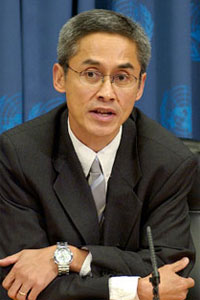
The recent deportation of three internationally recognised Cambodian refugees provoked an international outcry, much to Thailand's embarrassment. The first two were deported from Thailand on Nov 9, while the third was sent back home on Nov 20 to also face the risk of political persecution. Such efforts to "push back" refugees have regrettably tarnished Thailand's generally commendable policy and practice of offering refuge to persons fleeing persecution and other dangers from foreign territories. This is all the more poignant since Thailand's human rights record is in the middle of being assessed in Geneva under the UN's Universal Periodic Review (UPR).
It should not be forgotten that Thailand has a long history of offering refuge and protection to Cambodians. In the late 1970s and throughout the 1980s, tens of thousands of Cambodians were sheltered in such camps as Sa Kaeo and Kao I Dang in the Aranyaprathet area. Several hundred thousand Cambodians who were fleeing warfare were also assisted in various border sites near Thai territory. When the peace process arrived in Cambodia in 1991, the majority returned peacefully to their homes.
The current situation concerns the newer group of Cambodians who have sought protection in Thailand due to the precariousness of the situation in their homeland. A number have been recognised by the United Nations as persons of concern which is equivalent to refugee status internationally. In this regard, a key principle to be respected by all countries as part of International Law is "non refoulement", or the principle that pushing people back to areas of danger is prohibited. The practice in this region has also been to enable persons who have sought refuge or asylum to stay in the first country of refuge, at least until lasting solutions are found. A possible outlet would then be resettlement in a third country as a show of international solidarity.
There are more reasons why Thailand should abide by humanitarian practices. The country is a party to the International Convention against Torture and Cruel, Inhuman and Degrading Treatment (CAT) and as such needs to implement its stipulations. The CAT prohibits forced return or "refoulement" of persons who might be subjected to torture. There is currently a draft law in the Thai National Assembly to entrench this prohibition in the Thai legal system.
Thailand is also a party to the International Covenant on Civil and Political Rights (ICCPR) which calls for a screening process for aliens if the question of their expulsion arises. In reality, this is offered in part by a UN agency -- the Office of the UN High Commissioner for Refugees (UNHCR), which has a longstanding presence in Thailand. It screens people who seek refuge or asylum, and those who pass the test are classified as persons of concern, in principle, protected from being sent back and complemented by the possibility of a temporary stay in this country.
More recently, Thailand has adopted various procedures for Thai authorities to set up their own screening mechanism. Those seeking refuge who pass the test would be classified as "protected persons" and entitled to remain at least temporarily in Thailand, pending other solutions.
In addition, Thailand has a memorandum of understanding between national agencies to end the detention of children who are seeking refuge here, with or without their families, at immigration centres. The policy involves shifting them to welfare shelters linked with the social development agencies. Commendably, various NGOs have offered help in providing bail to enable the release of those seeking refuge who end up at these immigration centres.
In regard to the pending UPR process, Thailand seeks to send a positive image regarding its treatment of refugees, even though it prefers terms such as "illegal immigrants", "displaced persons" and more recently "protected persons". The kingdom is likely to accept some recommendations from its "peers" -- other countries that like to pass comment on Thailand's record in the UN Human Rights Council. While it is likely to decline recommendations to join the Refugee Convention, other recommendations on the humane treatment of persons who seek refuge in the country can be well supported.
The recent deportations raise questions as to how the Thai authorities synchronise their work and communicate from top to bottom to ensure they act consistently and in compliance with international standards. There needs to be an effective "chain of command" to prevent lapses which might lead to violations, such as people being sent back. A weighty political message from the cabinet to the national security authorities and the immigration authorities is essential to ensure there are no more deportations of internationally recognised persons of concern or refugees if that is not warranted.
Political issues and Thailand's relationship with the countries the refugees have fled remains a key challenge. Even through there may be bilateral pressure and other less transparent interests pressing for the forced return of refugees, their safety and the protection of their rights should not become bargaining chips in breach of human rights or International Law. Countries in Southeast Asia should respond well to the query raised by civil society: Do they have some form of informal pact to bypass international standards, thereby undermining the protection of refugees?
The preferred way for this region to proceed is to live up to its promise of being a caring community by "leaving no one behind", including those who seek refuge from danger. The region needs exemplary leadership to ensure that refugee protection is guaranteed. It should also address the root causes that force people to flee. The causes are inevitably tied to the struggle for peace, human rights, democracy and sustainable development in this region and beyond.
